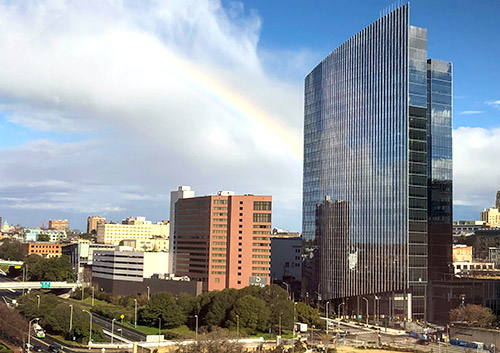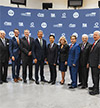The trend of corporate “hub and spoke” location decisions is becoming more prominent as companies look to decentralize and create specialty offices for their operations. With 12 Fortune 1000 headquarters plus multiple large divisional offices, Greater Richmond, Virginia, is prime example of a region that’s home to both “hubs” and “spokes.”
This trend is especially true for smaller, more specialized satellite “Spoke” offices that are still within easy distance of corporate headquarters. For example, data shows that companies and workers are increasingly moving from Washington, D.C., and the Northeast to the Greater Richmond area to take advantage of lower office costs, career opportunities, and a higher quality of life.
Richmond offers a variety of office spaces, ranging from more traditional uses as corporate headquarters to smaller buildings that can be customized to meet the needs of hybrid business models that include remote or rotating workforces.
This prosperous mid-size region is not only gaining new companies, but also benefiting from a steady in-migration of talented workers who are moving away from large cities to enjoy more affordable, safer, and less-congested communities. According to LinkedIn, Greater Richmond is one the top-10 cities in the U.S. that people are moving to during the COVID-19 pandemic. In addition to the one million-plus residents that already call the Greater Richmond area home, thousands of new residents are moving into the region, bringing new skills and perspectives.
Companies that locate in Greater Richmond enjoy an expanding, highly talented workforce and less expensive operating costs. The Tax Foundation indicates that Virginia’s business tax costs are among the most affordable in the U.S. Greater Richmond’s strategic Mid-Atlantic location and modern transportation infrastructure (especially its location along the bustling Interstate-95 corridor and proximity to several major cities) are always in high demand for companies that are looking to expand.
 Dominion Energy’s 20-story office tower is approximately one million square feet and occupies a whole block.Current Office-Space Trends
Dominion Energy’s 20-story office tower is approximately one million square feet and occupies a whole block.Current Office-Space Trends
From both commercial and residential real estate perspectives, Greater Richmond's cost savings, relative to more expensive coastal cities, is a high selling point. “High-quality office space is nearly 50 percent more affordable in Richmond than in nearby Washington, D.C.,” says Lisa Ruggles, senior vice president of global analytics, research, and news for Richmond-based CoStar, a provider of commercial real estate data.
As a result of COVID-19, there is currently an active amount of office space available for lease or sublease in the region. “With regard to our inventory availability, we are seeing interest from groups outside of the Greater Richmond area that are considering a move from locations such as Washington, D.C., northern Virginia, and Boston,” adds Charlene Whitfield, senior vice president of power delivery for Dominion Energy and vice chair for the Greater Richmond Partnership’s board of directors. The Greater Richmond Partnership is the lead economic development group for the City of Richmond and surrounding counties of Chesterfield, Hanover, and Henrico.
Richmond’s office market is fundamentally healthy, with a vacancy rate just above 7 percent. This rate has only increased slightly since the beginning of 2020 and through the pandemic, a testament to the region’s supply-demand balance. “Even with the uncertainty regarding shifts in office-using needs amid the pandemic, the local office market is still as competitive as it’s been in the past 15 years,” says Ruggles. “Office tenants have been more active in leasing space this year — just over two million square feet of space has been committed to through the first three quarters of 2021.”
According to LinkedIn, Greater Richmond is one the top-10 cities in the U.S. that people are moving to during the COVID-19 pandemic. Sometimes the best solution is to build to suit, especially if space needs are highly specialized. For example, the Virginia Alcoholic Beverage Control Authority (ABC) has built a 95,000-square-foot headquarters and 315,000-square-foot (expandable to 399,000 square feet) distribution center on a 40-acre site near I-295 in Hanover County. “Building new facilities was the most cost-effective choice and best fit ABC’s needs,” says Travis Hill, CEO of Virginia ABC. “The site is ideally situated to give us easy access to our major markets. For our administrative building, we primarily focused on increasing meeting space and providing our roughly 500 headquarters staff with more natural lighting and open collaboration areas.”
CoStar continues to commit to Greater Richmond through steady expansion over the past several years. For example, in 2016 CoStar’s total square footage was 69,000 square feet of space — by 2020 that had increased to 167,000 square feet.
“CoStar’s more than 1,000 Richmond-based employees returned to the office in mid-April from remote working and have remained there since,” says Ruggles. “We opened our second and third offices in Richmond over the past six months, bringing CoStar’s total office-using footprint to just over 231,000 square feet in downtown Richmond. That is more than a 200 percent increase in the past five years.”
Richmond’s office market is fundamentally healthy, with a vacancy rate just above 7 percent. A Strong and Flexible Office Space Market
More than 18 months into the COVID-19 pandemic, there is still no one-size-fits-all scenario for meeting office needs. As witnessed across the country, the onset of the pandemic temporarily stalled office leasing as decision-makers took a wait-and-see approach to understanding how their spatial needs might change. Moving into 2022, most companies will likely reassess their productivity and balance sheets to determine what office-space needs make the most sense for their respective workforces.
The Richmond region benefits from the combination of affordability, a well-educated employment base, and a pro-business environment that is supported by the area’s economic development organizations and local jurisdictions. “This collaboration has promoted both organic and inorganic growth of companies locally, with the latter becoming more pronounced over the past 12 months,” says Ruggles. “For example, SimpliSafe, Apex Systems, Babylon MicroFarms, and Aditxt Therapeutics have all completed or announced intentions to open Richmond-based offices. Each of these announcements came with net-new job gains for the area, which has been helpful to both the local economy and the local office market amid the pandemic.”
Richmond offers a variety of office spaces, ranging from more traditional uses as corporate headquarters to smaller buildings that can be customized to meet the needs of hybrid business models that include remote or rotating workforces.
This prosperous mid-size region is not only gaining new companies, but also benefiting from a steady in-migration of talented workers who are moving away from large cities to enjoy more affordable, safer, and less-congested communities. According to LinkedIn, Greater Richmond is one the top-10 cities in the U.S. that people are moving to during the COVID-19 pandemic. In addition to the one million-plus residents that already call the Greater Richmond area home, thousands of new residents are moving into the region, bringing new skills and perspectives.
Companies that locate in Greater Richmond enjoy an expanding, highly talented workforce and less expensive operating costs. The Tax Foundation indicates that Virginia’s business tax costs are among the most affordable in the U.S. Greater Richmond’s strategic Mid-Atlantic location and modern transportation infrastructure (especially its location along the bustling Interstate-95 corridor and proximity to several major cities) are always in high demand for companies that are looking to expand.

From both commercial and residential real estate perspectives, Greater Richmond's cost savings, relative to more expensive coastal cities, is a high selling point. “High-quality office space is nearly 50 percent more affordable in Richmond than in nearby Washington, D.C.,” says Lisa Ruggles, senior vice president of global analytics, research, and news for Richmond-based CoStar, a provider of commercial real estate data.
As a result of COVID-19, there is currently an active amount of office space available for lease or sublease in the region. “With regard to our inventory availability, we are seeing interest from groups outside of the Greater Richmond area that are considering a move from locations such as Washington, D.C., northern Virginia, and Boston,” adds Charlene Whitfield, senior vice president of power delivery for Dominion Energy and vice chair for the Greater Richmond Partnership’s board of directors. The Greater Richmond Partnership is the lead economic development group for the City of Richmond and surrounding counties of Chesterfield, Hanover, and Henrico.
Richmond’s office market is fundamentally healthy, with a vacancy rate just above 7 percent. This rate has only increased slightly since the beginning of 2020 and through the pandemic, a testament to the region’s supply-demand balance. “Even with the uncertainty regarding shifts in office-using needs amid the pandemic, the local office market is still as competitive as it’s been in the past 15 years,” says Ruggles. “Office tenants have been more active in leasing space this year — just over two million square feet of space has been committed to through the first three quarters of 2021.”
According to LinkedIn, Greater Richmond is one the top-10 cities in the U.S. that people are moving to during the COVID-19 pandemic. Sometimes the best solution is to build to suit, especially if space needs are highly specialized. For example, the Virginia Alcoholic Beverage Control Authority (ABC) has built a 95,000-square-foot headquarters and 315,000-square-foot (expandable to 399,000 square feet) distribution center on a 40-acre site near I-295 in Hanover County. “Building new facilities was the most cost-effective choice and best fit ABC’s needs,” says Travis Hill, CEO of Virginia ABC. “The site is ideally situated to give us easy access to our major markets. For our administrative building, we primarily focused on increasing meeting space and providing our roughly 500 headquarters staff with more natural lighting and open collaboration areas.”
CoStar continues to commit to Greater Richmond through steady expansion over the past several years. For example, in 2016 CoStar’s total square footage was 69,000 square feet of space — by 2020 that had increased to 167,000 square feet.
“CoStar’s more than 1,000 Richmond-based employees returned to the office in mid-April from remote working and have remained there since,” says Ruggles. “We opened our second and third offices in Richmond over the past six months, bringing CoStar’s total office-using footprint to just over 231,000 square feet in downtown Richmond. That is more than a 200 percent increase in the past five years.”
Richmond’s office market is fundamentally healthy, with a vacancy rate just above 7 percent. A Strong and Flexible Office Space Market
More than 18 months into the COVID-19 pandemic, there is still no one-size-fits-all scenario for meeting office needs. As witnessed across the country, the onset of the pandemic temporarily stalled office leasing as decision-makers took a wait-and-see approach to understanding how their spatial needs might change. Moving into 2022, most companies will likely reassess their productivity and balance sheets to determine what office-space needs make the most sense for their respective workforces.
The Richmond region benefits from the combination of affordability, a well-educated employment base, and a pro-business environment that is supported by the area’s economic development organizations and local jurisdictions. “This collaboration has promoted both organic and inorganic growth of companies locally, with the latter becoming more pronounced over the past 12 months,” says Ruggles. “For example, SimpliSafe, Apex Systems, Babylon MicroFarms, and Aditxt Therapeutics have all completed or announced intentions to open Richmond-based offices. Each of these announcements came with net-new job gains for the area, which has been helpful to both the local economy and the local office market amid the pandemic.”




